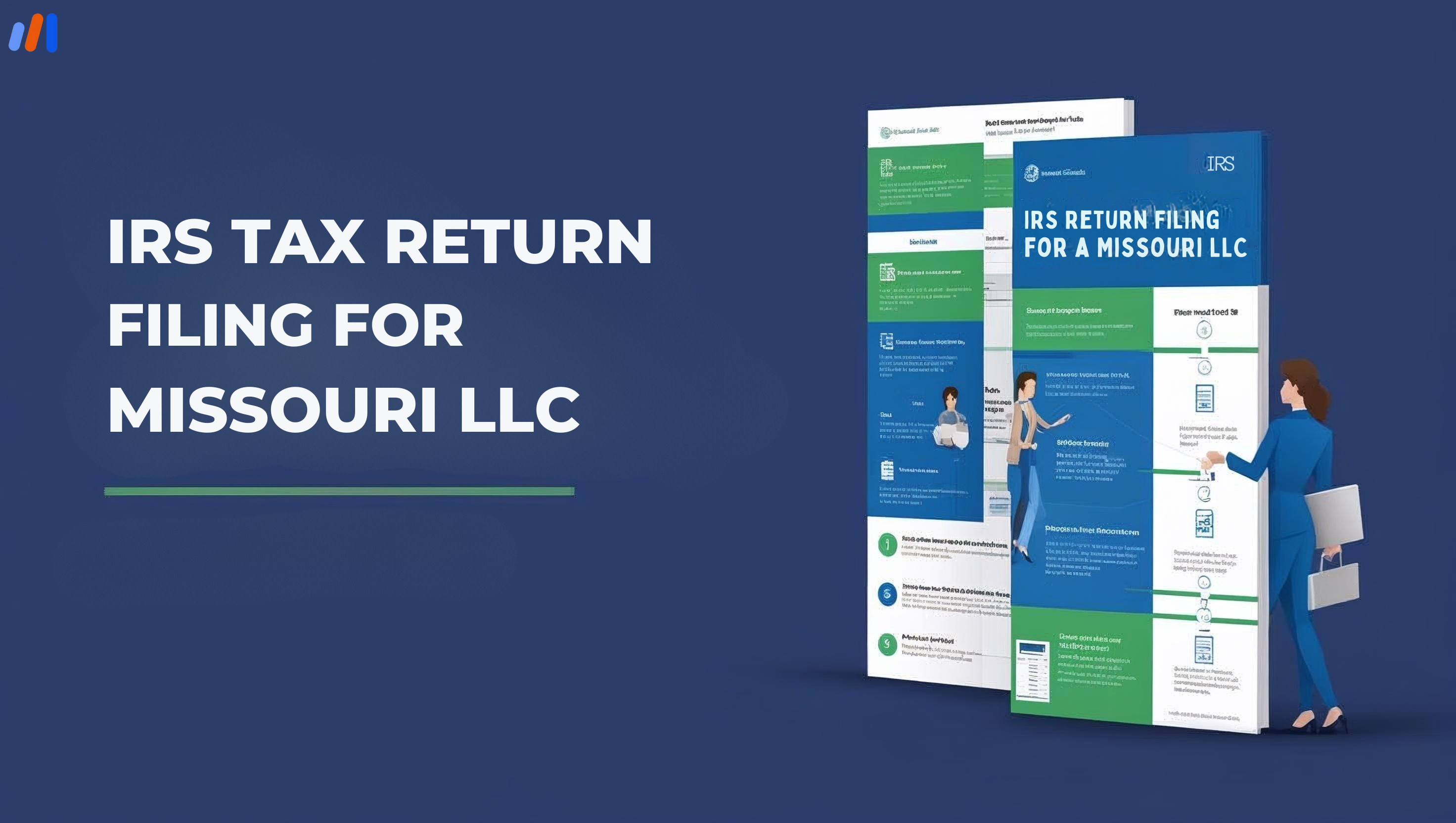Your LLC in Missouri comes with a federal and state tax obligation that needs to be paid during operating hours.
It is very clearly defined why these obligations need to be paid to avoid unnecessary penalties.
In this article, we will discuss the process of IRS tax return filing for Missouri LLC, focusing on classifying the taxes, reporting the taxes, deadlines, and other relevant details.
Federal Tax Filing Requirements for Missouri LLCs
By default, the IRS classifies LLCs as pass-through entities, meaning any business income makes its way to the owners’ tax returns. But how it’s taxed depends on the LLC’s classification. It is vital to know how your LLC is treated for tax purposes for proper filing.
1. Single-Member LLC
A single-member LLC is considered a disregarded entity for federal tax purposes. This means:
- The LLC does not file a separate tax return; business income and expenses are reported on the owner’s tax return.
- The owner must complete Schedule C (Form 1040) to report earnings and deductions.
- Self-employment tax applies, covering Social Security and Medicare contributions.
- Estimated quarterly tax payments may be required if the expected tax liability exceeds $1,000.
2. Multi-Member LLC
From the start, a multi-member LLC is taxed like a partnership and must submit:
- Form 1065 (United States Return of Partnership Income) is used for reporting the profit and associated costs of the business.
- Schedule K-1 (Form 1065) for every member with their respective share of profit, loss, deduction and credits.
- Every member needs to report their portion of earnings on the tax return form 1040.
- Active members of the LLC may be subject to self-employment taxes.
3. LLC Electing to Be Taxed as A Corporation
Some of the LLCs opt to be taxed as an unlimited company for possible benefits in taxation:
- S Corporation: will file Form 1120 S and will allocate profit and/or losses via Schedule K-1. The owners do not pay the self-employment tax on distributions.
- C Corporation: will file Form 1120 and will pay the corporate taxes, ignoring the income taxes of the LLC. The stockholders may also pay tax on the dividends received.
Missouri State Tax Obligations for LLCs
Certain state taxes are particular to Missouri that LLCs will have to comply with, including taxes on income as well as sales, depending on the nature of the business.
1. Missouri State Income Tax
- There is no tax on the corporate income of pass-through LLCs in Missouri.
- The owners of the LLC must declare their portion of income coming from the business activities on their tax return.
- As of 2025, Missouri uses a progressive income tax system with rates of 1.5% and 4.95%, This will certainly change next year.
2. Missouri Business Tax Requirements
Depending on the provisions made for your business, your LLC might be subject to other local taxes.
Sales Tax: If your LLC sells any items or services, you must comply with collecting taxes on sales. The 4.225% rate argued by the state, in addition to taxes made by the district councils, must also be accounted.
Employer Tax: LLCs with employees are liable to collect taxes from gross payments made to the employees and pay the Missouri Labor Department unemployment taxes.
Employment Taxes for LLCs with Employees
The tax responsibilities for the LLCs incorporated in Missouri become even harder due to the following:
- Employees are required to have their income and payroll taxes deducted before receiving their wages.
- Employers are required to file Form 941, Quarterly Payroll Tax Return, and Form 940, Annual Federal Unemployment Tax Return.
- To fulfill the unemployment requirements, taxes must be paid through the Missouri Division of Employment Security (DES).
- Depending on how many employees are in a company, holding compensation insurance is going to be necessary.
Filing Deadlines
Owners of LLCs are subject to the following guidelines and timeline to help avoid penalties for the outlined taxes:
March 15: Multi-member LLCs are due on the 15 of March, along with S Corporation LLCs’ 1120 S and Form 1065.
April 15: The deadline to file as a single-member LLC or C Corporation is on this day (LLCs file Schedule C of Form 1040 and C Corporations use Form 1120).
April 15: Missourians need to file their income taxes by this date.
Quarterly Tax Payments: Estimations are payable on this day, June 15th, September 15th, and January 15th.
Penalties for Late Filing
If you do not pay your taxes or file for a return on time, you incur penalties for late filing:
Federal penalties: The IRS has a 5% penalty monthly on unpaid taxes, which accumulates over time, reaching a cap of 25%.
Missouri State penalties: Depending on how late the state taxes are paid, there may also be penalties coupled with interest fees.
Failure to Pay Penalty: Against your tax dues, the IRS imposes a 0.5% penalty fee on the unpaid balance, with a maximum cap of 25%.
Payroll Tax Penalties: Penalties for taxes not covered by the payroll payable in severe.
Common Deductions Taxed for LLCs in Missouri
These LLCs have the option to take allowed deductions, which these LLCs can do to lessen tax liability, such as:
Office Expenses: Payment on rent, supply of electric utilities, the internet, the purchase of supplies, for filing, and the office.
Business Vehicle Expenses: Value of fuel spent on the business, maintenance of cars, and their relief value at the meters installed on the vehicle.
Employee Salaries and Benefits: Expenses on employees’ wages, health coverage, and payments towards the insurance scheme supervised by the board.
Marketing and Advertising Costs: Company funds spent developing a website, on digital advertising, and promotional activities.
Covering Services: Legal, Accountancy, and consulting services fall under professional services.
Travel and meals: Expenses for travelling for work, accommodation, and meals are allowed within certain limits set forth by the IRS.
How EasyFiling can help Missouri LLC Owners with Taxes:
Difficult is possibly the easiest way to describe tax filing, but with our expert EasyFiling services, your LLC can easily remain compliant. Here is how we help.
Filing taxes can be overwhelming at first, but with corporate EasyFiling, filing is statutorily compliant and accurate.
Expert Tax Guidance: We provide custom-tailored, professional tax advice for a particular legal entity, LLC, based on its operations and structure.
Accurate Filing Support: All federal and state tax forms, along with taxes, are filed accurately and on time.
Maximizing Deductions: Assist in claiming as many deductions as possible to lower tax obligations.
Complacent Monitoring Assistance: Doing the/is the primary compliance obligation and can help is/assist you with spending/allocation time for something besides work/year around.
Bookkeeping and Payroll Services: EasyFiling fully integrates personalized bookkeeping and payroll as the foundation for intelligent and sensitive automation for bringing out business finances.
Conclusion
As an owner of an LLC based in Missouri, knowing how to navigate the federal and regional regulations is extremely important when it comes to taxing your business.
Regardless of whether the LLC is considered a corporation, sole proprietorship, or partnership, both state and federal laws are to be followed.
If you want to ensure accurate taxation and receive the maximum benefits possible, working with a specialist in taxation or using the services offered by EasyFiling might be the right approach for you.
Being informed and strategically proactive will help you mitigate penalties and tax expenses, allowing you to dedicate more time to growing your business successfully.
Frequently Asked Questions (FAQs)
1. Is there an annual franchise tax for LLCs in Missouri?
Missouri LLCs are not subject to an annual franchise tax, but some corporations in the state might still be liable for franchise tax.
2. What is the process of obtaining a Sales Tax License in Missouri?
You are able to apply for a license digitally through the site of the Department of Revenue of Missouri. Upon registration, you will need to pay sales tax for the tax periods assigned.
3. Are LLCs eligible for taxation credits within Missouri?
Missouri provides a variety of tax credits to businesses, which include the Small Business Tax Credit and the Missouri Works Program. Subject qualifications include business activity and compliance with state law.
4. Are Non-Resident LLC Owners Required To Pay Income Tax?
Non-resident LLC owners may have to file for a Missouri state tax return if they make money from Missouri-based operations. With partnerships and S corporations, Missouri does impose a non-resident tax withholding restriction.
5. What Steps Can I Take To Minimize My Missouri LLC Tax Obligation?
Tax liability can be minimized by claiming qualifying deductions, using tax credits, maintaining precise financial documents, and working closely with a tax expert to fully maximize your tax outcomes.
File Your LLC Today
25$ off with a coupon
Lock in EasyFiling's transparent rates and get lifetime compliance support at no extra cost.
Get Started Now









